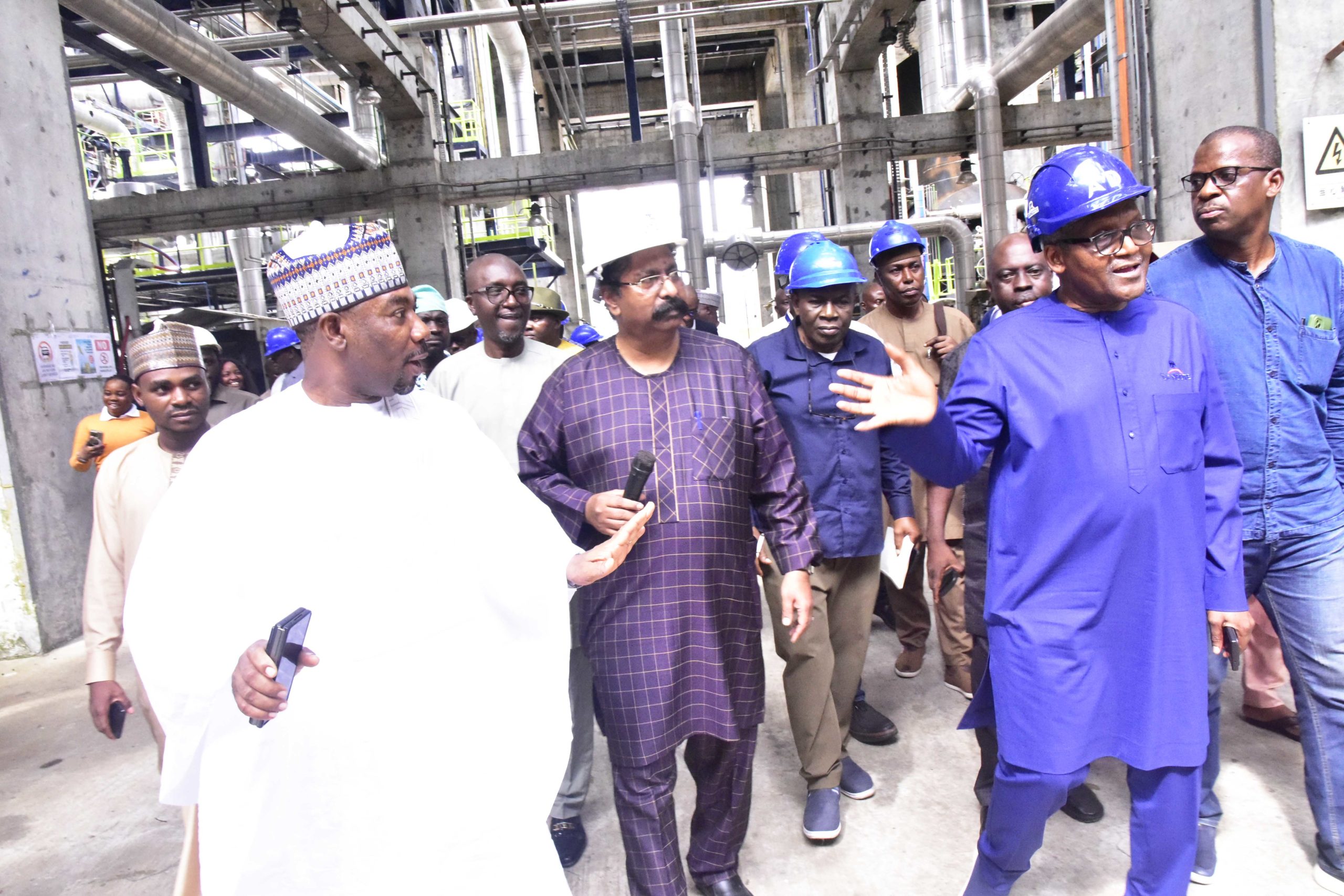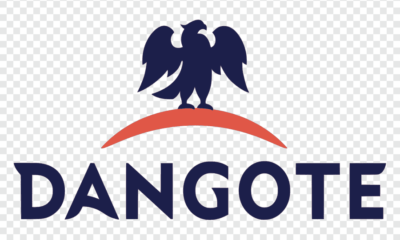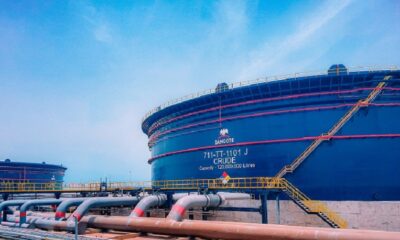Business
Dangote Optimistic Projected $30bn Revenue Will Boost Naira Value

President of Dangote Group, Aliko Dangote, on Sunday declared that his company’s aim is to become the leading supplier of Foreign Exchange in the domestic market soon.
This is even as his company targets $30 billion in revenues by the year 2025.
Dangote bared his mind during a tour of the Dangote Petroleum Refinery & Petrochemicals and Dangote Fertiliser Limited with media executives at the weekend.
According to him, the plan is to attain independence from the Central Bank of Nigeria (CBN) in forex sourcing, highlighting a strategic shift in revenue composition within the cement business from the current 75 percent to 15 percent in the future.
The expected significant inflow of forex into Nigeria through his businesses, will automatically boosts the value of our local currency and make Naira regain its value in the comity of international currencies all over the world.
ALSO READ: Shell Nigeria Explores Opportunities With Dangote Refinery
He maintained that the refinery began full operations in 2024, initially focusing on refining intermediate products such as polypropylene, naphtha, RCO, gasoline, diesel, and jet fuel.
He explained that the refinery entered its steady-state production phase in March 2024.
Additionally, he anticipates production ramping up to 500,000 barrels per day (bpd) with 15 crude cargoes per month by August, increasing to 550,000 bpd by the end of the year, and aiming for 650,000 bpd by the first quarter of 2025.
“Petrol production is to commence in July with sales from August,” assured Dangote.
Dangote also hinted that the group intends to list both Dangote Petroleum Refinery & Petrochemicals and Dangote Fertilizer Limited on the Nigerian Exchange Group in the first quarter of 2025.
He said that this initiative would enable Nigerians to participate in the ownership of these companies.
“Due to the nature of our business with both the refinery and the fertilizer, we are aiming to list them by the end of this year. However, depending on circumstances, worst-case scenario, we anticipate listing them before the end of the first quarter of next year. This will allow us to offer shares for sale and enable Nigerians to participate as shareholders,” Dangote stated.
The Dangote Refinery, which will process 650,000 barrels per day (BPD) at full capacity, stands as Africa’s largest oil refinery and the world’s largest single-train facility, while the Dangote Fertiliser Limited operates Africa’s largest Granulated Urea Fertiliser complex. Presently, Dangote Cement is Nigeria’s most capitalised company.
While noting that the total storage capacity of the refinery is 4.5 billion litres, sufficient to cover 20 days of Nigeria’s crude requirement and store products equivalent to 15 days of Nigeria’s petrol consumption, he stressed that the refinery would produce 53 million litres of petrol per day and 1.1 million tonnes per day.
He added that the refinery is equipped with dedicated loading gantries featuring 86 loading bays, alongside specialized marine facilities for the offloading of crude and the loading of petroleum products.
Additionally, the facility, he said, includes a 900-kilotonne per annum polypropylene plant, with production capacities of 36,000 tonnes per annum for sulphur and 585,000 tonnes per annum for carbon black.
He pointed out that over the past four decades, the operations of the Dangote Group have evolved significantly from a commodity trading company to a diversified conglomerate.
Dangote emphasised that this transformation was driven by the overarching goal of achieving self-sufficiency in key sectors and bolstering Nigeria’s economy.
He noted that the group, which began as a trading company in 1978, has expanded into a diversified conglomerate with investments spanning cement, agriculture, fertilizer, petrochemicals, oil & gas, auto assembly, infrastructure, and other sectors.
He said the group is driven by the idea that Africa’s future prosperity hinges on its ability to harness its own resources and capabilities. Dangote stressed that the continent inadvertently imports poverty and exports jobs by exporting raw materials and importing finished goods.
The Vice President, Oil and Gas, Dangote Industries Limited, Devakumar Edwin, reiterated the commitment of the company in enhancing local capacity in critical sectors of the economy.
He said Dangote Industries Limited has empowered young Nigerians to assume key roles across its operations, with many even becoming expatriates in other nations.
Edwin stressed the refinery’s status as the world’s largest single train complex constructed entirely by a Nigerian company, highlighting a significant achievement in local engineering and construction capabilities.
Noting that most refineries were built by foreign companies, he said it is a thing of pride that a Nigerian company, acting directly as Engineering, Procurement, and Construction (EPC) contractor, designed and built the world’s largest single train refinery complex. He said this has enhanced the capacity of many Nigerians involved in the process and that a Nigerian company can build a refinery anywhere in the world.
“It is a thing of pride that the largest single train refinery in the world is 100% designed, engineered, and constructed by a Nigerian company as EPC contractor,” he said.
While expressing gratitude to the media executives, Group Executive Director of Commercial Operations at Dangote Industries Limited, Fatima Dangote, reiterated the company’s dedication to creating a positive impact on the economy. She commended Aliko Dangote’s steadfast commitment to advancing the continent’s development.
“He (Dangote) is committed to ensuring the success of Nigeria and Africa as a nation and a continent. Our focus extends beyond profit to solving problems and achieving self-sufficiency across all sectors in Africa. By meeting global standards, we have positioned ourselves to export our products to every continent in the world,” she said.
Fatima pointed out that the group is not only the largest private employer of labour but also consistently ranks as one of the top taxpayers in the country each year, adhering to all relevant tax laws and regulations.
“We are known as one of the largest employers of labour. However, we are also conscious of ensuring our workers enjoy a good living standard. This is reflected in our inclusion in the list of top paying firms in the country. Our impact on employment generation extends to creating thousands of indirect jobs in the various communities that we operate in,” she added.
Business
Savannah Energy Provides Unaudited FY 2024 Trading Updates

Savannah Energy has shared a trading update on its Nigerian operations and other markets in Africa, including up-to-date cash collections in its Nigerian business.
According to the update, made available on Thursday in Lagos, its gross production in Nigeria averaged 23.1 Kboepd for FY 2024, broadly in line with the prior year’s 23.6 Kboepd, of which 88% was gas (FY 2023: 91%).
On the update, CEO of Savannah Energy, Andrew Knott, said, “I am pleased to provide a FY trading update which demonstrates the continued progress we have made in 2024, a year which saw the highest level of cash collections ever recorded by our Nigerian business. 2025 is expected to be an exciting year for our Company: we have a large planned operational programme in Nigeria which is anticipated to enhance both our oil and gas production levels and capacity; we intend to progress our R3 East oil development project in Niger; we continue to pursue key acquisitions in the upstream oil and gas space; and we continue to seek to build our power business.
“Fundamentally, Savannah remains unequivocally an “AND” company, seeking to deliver strong performance both for the short AND long term across multiple fronts, and pursuing growth opportunities in both the hydrocarbon AND power sectors.”
The update It also shows that it generated a Total Income of US$393.6 million in 2024, compared to FY 2023’s US$289.8 million. This consists of Total Revenues of US$258.7 million and Other operating income of US$134.9 million.
The report also shows that Savannah’s FY 2024 Total Revenues were ahead of the previously issued financial guidance of greater than US$245 million, while FY 2024 financial guidance is reiterated for Operating expenses plus administrative expenses at ‘up to US$75 million’. The company expects its FY 2024 capital expenditure to come in lower than planned (previously guided at ‘up to US$50 million’) due to the phasing of spend.
ALSO READ: CSR: Dangote Awards Scholarships To 473 Students
According to the update, Savannah’s cash collections in 2024 amounted to US$248.5 million, a slight increase from the US$206 million it received in 2023. The report further shows that its cash balances as at 31 December 2024 stood at US$32.6 million, compared to the 31 December 2023 figure of US$107.0 million.
The report shows that the company’s midstream subsidiary, Accugas Limited, had as at 31 December 2024 drawn down on its NGN332 billion of the NGN Transitional Facility, with the resulting funds being converted to US$, which, along with cash held, was used to partially prepay the existing Accugas US$ Facility, leaving a balance as at 31 December 2024 of approximately US$212.3 million.
The report also provided new updates on Accugas’ US$45 million Uquo Central Processing Facility (“Uquo CPF”) compression project in Nigeria, noting that its commissioning which will enable the expansion of gas production in the medium term is well underway.
The report highlighted the progress being made in the procurement process of long lead equipment in Nigeria for a potential two-well drilling campaign on the Uquo Field in H2 2025, with an additional gas development well expected to add up to 80 MMscfpd of supplemental production capacity and a potential exploration well targeting an Unrisked Gross gas initially in place (“GIIP”) of 154 Bscf (25.7 MMboe) of incremental gas resources.
The update shows that progress is also being made in the planned Savannah acquisition of Sinopec International Petroleum Exploration and Production Company Nigeria Limited, whose principal asset is a 49% non-operated interest in the Stubb Creek oil and gas field (“Stubb Creek”), with regulatory approval and completion being targeted in Q1 2025. Following the completion of the acquisition, Savannah intends to commence an expansion programme which is anticipated to increase Stubb Creek gross production from an average of 2.7 Kbopd in 2024 to approximately 4.7 Kbopd.
In Niger, Savannah continues to seek to progress its 35 MMstb (Gross 2C Resources) R3 East oil development in South-East Niger, while it continues to push for a potential alternative transaction structure to acquire a material stake in producing oil and gas assets in South Sudan as previously announced on 20 December 2024.
On the renewable energy front, the update shows that Savannah has up to 696 MW of renewable energy projects currently in motion, including the up to 250 MW Parc Eolien de la Tarka wind farm project in Niger and the up to 95 MW Bini a Warak hybrid hydroelectric and solar project in Cameroon. A firm believer in Africa’s transition to renewable energy, Savannah continues to target a portfolio of up to 2 GW+ of power projects in motion by the end of 2026.
Business
Nigeria Can Achieve 5.5% GDP Growth – NESG
The Nigerian Economic Summit Group (NESG) has projected that the country has the potential to achieve a 5.5% growth in Gross Domestic Product (GDP) if critical policy reforms are sustained.
This was disclosed on Thursday during the launch of the NESG’s 2025 Macroeconomic Outlook report.
Speaking at the event, the Chief Economist and Director of Research & Development at NESG, Dr. Olusegun Omisakin, highlighted the need for more efficient policy implementation to unlock Nigeria’s economic potential.
READ MORE: Davido Is Richer Than His Billionaire Father – Ibrahim Chatta Claims
“We believe at the optimal level, if we embark on more efficient policy reforms, the Nigerian economy has the potential, the GDP to end up at 5.5 per cent, and we believe that this is achievable,” Omisakin stated.
More to follow……….
Business
CBN Approves Release Of Nigerian FX Code
The Central Bank of Nigeria (CBN) has announced the release of the Nigerian Foreign Exchange (FX) Code, a set of guidelines designed to promote ethical conduct among authorized dealers in the country’s FX market.
In a statement, the apex bank disclosed that the official launch of the Code would take place on Tuesday, January 28, 2025, at the CBN Head Office Auditorium in Abuja.
READ MORE: Dangote Denies Culpability In Pumping Up Petrol Price
“The Central Bank of Nigeria has approved the release of the Nigerian Foreign Exchange (FX) Code as a guideline to the banking industry to promote the ethical conduct of authorised dealers in the Nigerian Foreign Exchange Market,” the statement read.
The introduction of the FX Code is expected to enhance transparency, accountability, and professionalism within Nigeria’s foreign exchange ecosystem, aligning it with global best practices.
The event is anticipated to attract key stakeholders in the financial and banking sectors, as well as representatives from authorized FX-dealing institutions across the country.























